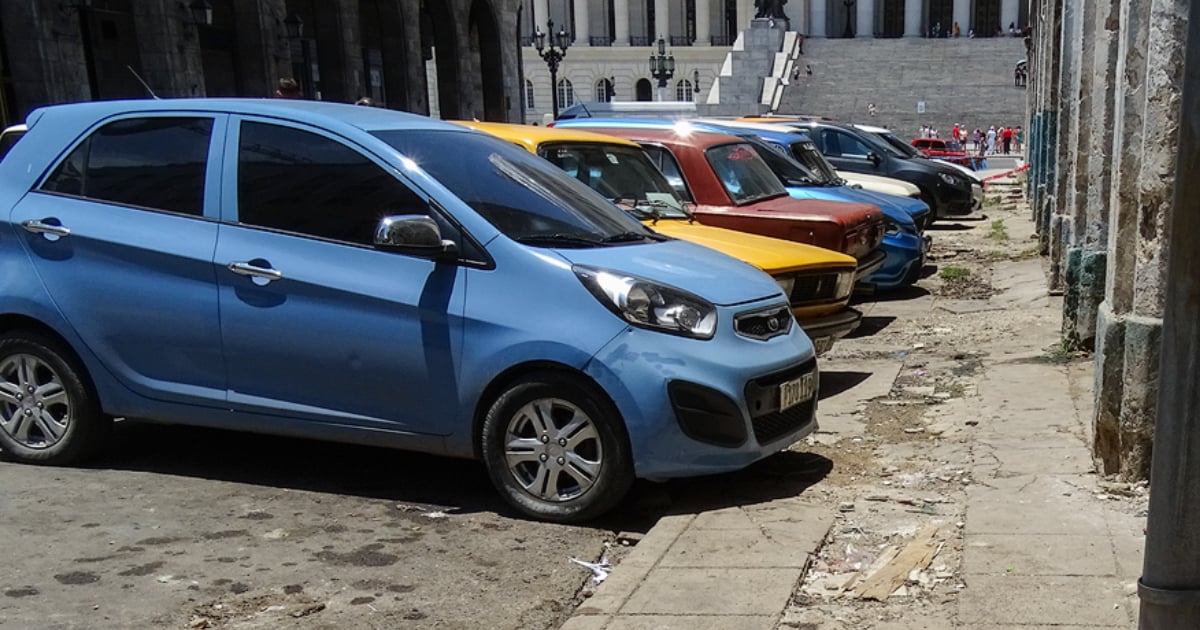The Minister of Transport, Eduardo Rodríguez Dávila, recently shared a series of updated figures on social media regarding the import prices of vehicles in Cuba. His post included two infographics detailing how the Cuban government sets the prices for imported cars. Rodríguez explained that they used a hypothetical value of $10,000 USD "to facilitate understanding." This contentious issue has sparked criticism against the regime due to the exorbitant prices of imported cars on the island, making it an unattainable dream for many highly qualified professionals in the country.
Price Formation for Imported Vehicles
The process of determining the final price of vehicles in Cuba involves several components. First, the Supplier Price delivered in Cuba is considered, which is the initial value of the vehicle, including freight and insurance. This base price, as shown in the infographic, is $10,000 USD or euros.
To this base price, Import Costs are added, which include tariffs, customs services, handling, and transportation of the vehicle, representing approximately 6% of the supplier's price, equivalent to $600 USD or euros.
The next component is the Commercial Margin Rate, which is a margin applied by the selling entity in Cuba. This margin can reach up to 20% of the base price, resulting in an increase of $2,120 USD or euros, bringing the selling price of the dealer to $12,720 USD or euros.
Additionally, a Special Segment or Range Tax is applied, which varies according to the type of vehicle. For high-end cars, this tax is 35%, equivalent to $4,452 USD or euros, while for other types of vehicles it can be 25% or 15%.
The total amount payable by the buyer is determined by adding all these components. For example, a car, rural vehicle, or pickup truck has a final price of $15,900 USD or euros; a high-end car reaches $17,172 USD or euros; while other classes of vehicles like minibuses, motorcycles, or tricycles have prices ranging from $14,628 to $15,264 USD or euros.
Additional Taxes and Exemptions
The pricing system also includes additional taxes for those who acquire more than two vehicles, with rates progressively increasing up to 100% from the sixth vehicle onward.
However, electric cars enjoy certain exemptions, such as no tariffs and a reduced percentage in customs services, despite the lack of infrastructure in Cuba to support these vehicles.
The prices and policies have sparked widespread debate on social media. Users have questioned the logic behind applying taxes on the value of freight and have expressed concerns over the high costs.
A notable comment came from an intensivist doctor at a Cuban hospital who questioned how many years he would have to work to afford a car under the current policies.
Regulatory Context and Recent Measures in Cuba
In July, the Cuban government allowed the importation of vehicles by Cubans on missions abroad, including medical brigades and diplomatic personnel, as discussed in the National Assembly of People's Power.
Additionally, Prime Minister Manuel Marrero Cruz mentioned a new policy for the transfer of motor vehicle ownership, which is currently under review for implementation.
Moreover, the importation and commercialization of vehicles in convertible currencies continue, with prices adjusted for natural and legal persons, aiming to facilitate access to transportation and raise funds for the development of public transport in Cuba.
These measures are part of the update to the car commercialization policy in Cuba, following the approval of Decree 83/2023, which regulates the transfer of vehicle ownership and their commercialization in freely convertible currency.
The regime asserts that the revenues obtained from tariffs and taxes will be directed towards the recovery and development of public transportation in the country.
This issue has generated intense debate on social media and criticism of the government amid the severe transportation crisis in Cuba. Sector authorities will be on the official program Mesa Redonda tonight to provide more specific details on the prices of imported cars in Cuba.
Frequently Asked Questions about Imported Car Prices in Cuba
This section aims to address some common questions regarding the controversial import prices of vehicles in Cuba and the policies surrounding them.
What factors are considered in the final price of imported vehicles in Cuba?
The final price includes the supplier price, import costs, commercial margin rate, and a special segment or range tax.
Are there any tax exemptions for electric cars in Cuba?
Yes, electric cars are exempt from tariffs and have a reduced percentage in customs services, although there is a lack of supporting infrastructure in Cuba.
What recent measures has the Cuban government taken regarding vehicle importation?
In July, the government allowed vehicle importation by Cubans on missions abroad, including medical brigades and diplomatic personnel. The government is also reviewing a new policy for the transfer of motor vehicle ownership.
